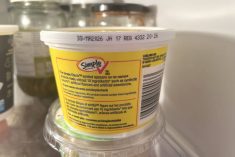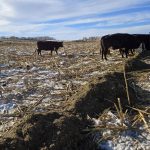“We just hope there are people who understand all aspects of it.”
– GARY SLOIK, KEYSTONE POTATO PRODUCERS ASSOCIATION
Amove by the fast-food restaurant company McDonald’s to reduce pesticide use on potatoes for french fries could have serious implications for Manitoba potato growers.
Potatoes are such a high-demand crop for pesticides that reducing their use would be very difficult, growers say.
For that reason, McDonald’s should tread carefully before telling producers to cut back on them, said Gary Sloik, secretary-manager of Keystone Potato Producers Association.
Read Also

Horse welfare trial begins in Manitoba
Private prosecution of Manitoba horse farm, based on a 2022 horse export shipment, awaits judge’s verdict after two-day trial in Winnipeg.
“We hope these people have an open mind to all aspects of looking at this and seeing whether it’s possible,” Sloik said.
“We just hope there are people who understand all aspects of it.”
McDonald’s Corp., the largest potato buyer in the U. S., has agreed to seek ways to reduce the use of pesticides in its American potato supply chain. It will survey its U. S. potato suppliers, identify best management practices for pesticide reduction and encourage suppliers to follow them.
SHAREHOLDER PRESSURE
McDonald’s agreed to do so after a shareholder resolution filed Dec. 8, 2008 called for the company to publish a full report on reducing pesticide use throughout its entire supply chain.
Following discussions, the two sides agreed the report would become just a survey and only on potatoes. The resolution was withdrawn as a result.
The survey does not have a deadline date by which it must be filed, said Richard Liroff, executive director of the Investor Environmental Health Network. The IEHN is a group of money managers working to encourage companies to adopt safer chemical practices.
“The investors did not want to be overly prescriptive,” Liroff said from IEHN headquarters in Falls Church, Virginia. “We want to work collaboratively with the company to advance pesticide-use reduction, taking into account work already underway elsewhere, so McDonald’s doesn’t have to reinvent the wheel.”
Liroff noted other companies, such as Sysco (which supplies Wendy’s), General Mills and Campbell’s, already have initiatives to reduce pesticide use.
SUSTAINABLE
In a statement, McDonald’s said U. S. potato suppliers already work with their growers on sustainable pesticide practices, such as reductions and alternative methods.
“We agreed to conduct a survey in 2009 to more formally summarize those practices and we will share the key findings from that survey with our global potato suppliers,” the statement said.
McDonald’s has a record of responding to environmental pressure, going back to the early 1990s when it phased out Styrofoam food containers in favour of recyclable cardboard.
The company also encourages animal welfare-friendly practices for its egg and pork suppliers, such as cage-free systems for laying hens and open housing for pregnant sows.
Because of its track record, McDonald’s is expected to eventually push for reduced pesticide use as well.
That makes Manitoba potato growers nervous because the province’s two largest potato processors – McCain Foods (with plants in Portage la Prairie and Carberry) and Simplot Canada (located just outside Portage) – are major french fry suppliers to McDonald’s.
Sloik said Manitoba growers already use pesticides judiciously and follow other environmentally sustainable practices. “Input costs are such that growers don’t want to spray any more than they have to.”
Pesticides are a major input cost for potato farmers. Manitoba Agriculture, Food and Rural Initiatives estimates pesticides are responsible for over 15 per cent of a producer’s annual operating costs.
A MAFRI guideline for growing irrigated processing potatoes on 399 harvested acres estimates a total operating cost of $1,443.59 per acre. Fungicides and insecticides together cost $174.74 per acre. Herbicides are $47.44 per acre.
“We’re doing everything right,” Sloik said. “We’ve increased our efficiencies and taken a lot of cost out of the system.”
FUNGICIDE USE HEAVY
Even so, growers still use large volumes of pesticides, mainly fungicides to control late blight and insecticides to control the Colorado potato beetle. Producers sometimes apply fungicides as often as once a week during the growing season, said Tracy Shinners-Carnelley, a MAFRI potato pest specialist.
One way to use less pesticide is to grow pest-resistant genetically modified potatoes. Such varieties do exist. But none is grown in Canada today, after McCain stopped buying them in 2000 because of consumer concern over GM foods.
“GM would be our biggest step,” Sloik said. [email protected]














